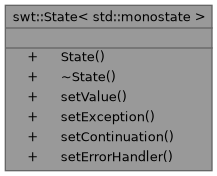Template specialization for void-returning promises. More...
#include <State.h>

Public Member Functions | |
| State () | |
| Default constructor - initializes empty void state. | |
| ~State () | |
| Destructor - cleanup void state. | |
| void | setValue (std::monostate &&value) |
| Set completion state for void promise. | |
| void | setException (std::exception_ptr exception) |
| Set exception state for void promise. | |
| template<typename F > | |
| void | setContinuation (std::shared_ptr< SLLooper > &looper_, F &&continuation) |
| Register continuation callback for void promise completion. | |
| template<typename F > | |
| void | setErrorHandler (std::shared_ptr< SLLooper > &looper_, F &&errorHandler) |
| Register error handler for void promise rejection. | |
Detailed Description
Template specialization for void-returning promises.
This specialization handles promises that don't return values (void functions) by using std::monostate as the internal value type. This allows the promise framework to work uniformly with both value-returning and void functions while maintaining type safety.
Key differences from the general template:
- Continuation signature: void() instead of void(tValue)
- Internal value type: std::monostate instead of tValue
- API consistency: Same interface as general template
- Note
- Specialization maintains API consistency for void promises
- std::monostate is a dummy type representing "no value"
- See also
- State, Promise<void>
Constructor & Destructor Documentation
◆ State()
|
inline |
◆ ~State()
|
inline |
Member Function Documentation
◆ setContinuation()
| void swt::State< std::monostate >::setContinuation | ( | std::shared_ptr< SLLooper > & | looper_, |
| F && | continuation | ||
| ) |
Register continuation callback for void promise completion.
- Template Parameters
-
F Function type for continuation callback
- Parameters
-
looper_ SLLooper instance for callback execution continuation Callback function with void() signature
Registers a continuation callback that takes no parameters, appropriate for void-returning promises.
- Note
- Continuation signature is void() not void(std::monostate)
- Implementation in State.tpp
- See also
- SLLooper
◆ setErrorHandler()
| void swt::State< std::monostate >::setErrorHandler | ( | std::shared_ptr< SLLooper > & | looper_, |
| F && | errorHandler | ||
| ) |
Register error handler for void promise rejection.
- Template Parameters
-
F Function type for error handler callback
- Parameters
-
looper_ SLLooper instance for error handler execution errorHandler Callback function to execute when exception occurs
Identical behavior to general template - registers error handler with std::exception_ptr parameter.
- Note
- Implementation in State.tpp
- See also
- SLLooper
◆ setException()
| void swt::State< std::monostate >::setException | ( | std::exception_ptr | exception | ) |
Set exception state for void promise.
- Parameters
-
exception Exception pointer to store
Identical behavior to general template - sets exception state and triggers error handler if available.
- Note
- Implementation in State.tpp
- See also
- setException
◆ setValue()
| void swt::State< std::monostate >::setValue | ( | std::monostate && | value | ) |
Set completion state for void promise.
- Parameters
-
value std::monostate value (represents completion)
Marks the void promise as completed and triggers any registered continuation callback. Uses std::monostate to represent completion without an actual value.
- Note
- Implementation in State.tpp
- See also
- setValue
The documentation for this class was generated from the following files: